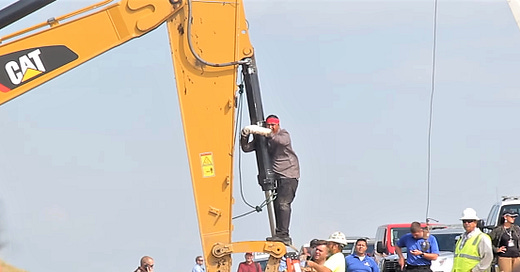Greenpeace vs. Energy Transfer: A Verdict That Could Reshape Activism
Diary: Saturday, 5 March, 2025
Last month, a North Dakota jury has ordered Greenpeace to pay $660 million in damages to Energy Transfer, the company behind the controversial Dakota Access Pipeline (DAPL). The ruling, which stems from Greenpeace’s alleged role in protests nearly a decade ago, is seen not only as a financial blow to one of the world’s leading environmental organisations, but also as an attack on free speech and environmental advocacy.
The Dakota Access Pipeline protests, began in 2016, led by the Standing Rock Sioux Tribe, and joined by environmental groups including Greenpeace. Protesters raised serious concerns about the pipeline's potential to contaminate water sources, destroy sacred Indigenous sites, and accelerate climate change. The protests became a symbol of Indigenous resistance and environmental justice.
Energy Transfer hit back hard. It accused Greenpeace of defamation, conspiracy, and trespassing, claiming the organisation funded and trained protesters who disrupted construction and spread misinformation about the project.
Why Greenpeace lost
From the start, the trial raised alarms. It took place in Morton County, North Dakota—a region with deep economic and cultural ties to the oil industry. The jury composition, was, one might say, a bit problematic. According to Steven Donziger, a human rights and environmental lawyer, of the eleven jurors, seven had direct or indirect ties to the fossil fuel sector and some have admitted their inability to remain impartial. Still, the judge allowed them to serve.
This environment also appeared to favour the company. Energy Transfer’s founder and CEO, Kelcy Warren, made a large donation to Trump’s 2017 inaugural committee. The administration swiftly approved a critical easement for the Dakota Access Pipeline—overruling an Obama-era decision.
The absence of Indigenous representation on the jury was particularly notable, given the central role of Native rights in the protests. Greenpeace’s involvement in the Dakota Access Pipeline was relative limited: of the estimated 100,000 protesters at Standing Rock, only six were affiliated with the organization. Yet, Greenpeace was held liable for the entirety of the claimed damages over the seven-month protest period.
Transparency was another casualty of the proceedings. Major outlets like The New York Times and Wall Street Journal were denied requests to live-stream the trial. Crucial court documents were sealed, limiting public scrutiny. Evidence, including expert analysis of pipeline leaks, was ruled inadmissible, preventing Greenpeace from challenging assertions about the pipeline's safety.
Greenpeace has characterised the case as a textbook SLAPP (Strategic Lawsuit Against Public Participation)—a legal tactic increasingly used by corporations to intimidate and bankrupt those who dare to dissent.
In the meantime, in the U.K.
This clampdown on protest isn’t limited to the United States. In the UK, recent legislation has triggered alarm over the criminalisation of climate activism. The Police, Crime, Sentencing and Courts Act 2022 and subsequent Public Order Act 2023 introduced sweeping restrictions on peaceful protests, including noise limits, expanded stop-and-search powers, and severe penalties for nonviolent civil disobedience. These laws have led to record prison sentences for activists engaging in protests. Sixteen climate activists recently appealed prison sentences—some as long as five years—for acts such as scaling the M25 or merely discussing protest plans over Zoom. While six sentences were slightly reduced, the majority were upheld. Critics have condemned this as a “disproportionate punishment” for peaceful protest.
Beyond Borders
What connects these stories—from the North Dakota plains to Britain’s motorways—is a growing global trend: the tightening grip on protest. Governments and corporations appear increasingly willing to use the law not to uphold order, but to silence critics.
As environmentalists regroup and prepare for further legal battles, one thing is clear: this isn't just Greenpeace’s fight. It’s about safeguarding the rights of individuals and organisations to speak out against injustice without fear of financial ruin or legal intimidation. If dissent can be bankrupted or imprisoned, democracy itself risks erosion.
Image: August 31st, 2016 - North Dakota - The #NoDAPL water protectors who have come to stand with Standing Rock Sioux Tribe took non-violent direct action by locking themselves to construction equipment. Source: Wikipedia
Sources:
From Dams to DAPL, the Army Corps’ Culture of Disdain for Indigenous Communities Must End
Greenpeace Faces Tough Start in Trial Over Dakota Access Pipeline Protests - The New York Times
Here Are The Billionaires Who Donated To Donald Trump’s 2020 Presidential Campaign
A court ordered Greenpeace to pay a pipeline company $660M. What happens next? | Grist
Climate activists seek to appeal sentences in landmark case – The Justice Gap
UK court throws out appeals by 10 of 16 imprisoned environmental activists | AP News



